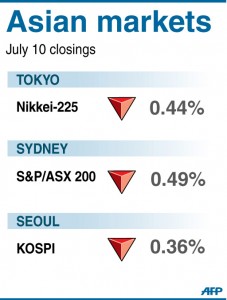Asian markets fall on weak China imports

Official data showed China’s trade surplus expanded in June as demand for imports fell more sharply than expected, adding to investor nerves before the release of more key data this week including second-quarter GDP.
Tokyo ended 0.44 percent, or 39.15 points, lower at 8,857.73, while Sydney finished 0.49 percent, or 20.3 points, down at 4,098.0, and Seoul was off 0.36 percent, or 6.68 points, at 1,829.45.
Shanghai closed down 0.29 percent, or 6.37 points, to 2,164.44, while Hong Kong was off 0.16 percent, or 31.73 points, to end at 19,396.36.
Regional bourses tracked declines in the United States and Europe, extending heavy losses they made on Monday.
“The market is currently holding a very negative view on China’s economy,” Ben Kwong, chief operating officer at KGI Asia, told Dow Jones Newswires.
Article continues after this advertisementThe trade surplus widened last month to 42.9 percent compared to the same period the previous year, according to figures from the General Administration of Customs.
Article continues after this advertisementExports for the month rose 11.3 percent year on year to $180.21 billion, but imports climbed just 6.3 percent to reach $148.48 billion, according to government data.
Amid a string of negative figures from the world’s second-biggest economy, the government has sought to revive growth with measures including two interest rate cuts in the past month.
Analysts had already flagged more government action to boost growth after China reported Monday that the pace of inflation slowed to a 29-month low in June.
The economy expanded an annual 8.1 percent in the first quarter, its slowest pace in three years. The government will release the gross domestic product for the second quarter on Friday, with growth expected to have slowed further.
The euro, meanwhile, slipped against major currencies after European leaders’ latest effort to shore up the ailing currency bloc was met with scepticism.
After marathon talks in Brussels, eurozone finance ministers agreed to offer Spain 30 billion euros ($37 billion) this month to help its distressed banks.
They also extended a deadline for Madrid to cut its public deficit to the European Union’s 3 percent limit by one year to 2014 because of the difficult economic conditions. But traders were unimpressed.
The Spain agreements were “more or less details of procedures and unlikely to affect the entire picture of the eurozone trouble,” said Yosuke Hosokawa, head of FX sales team at Sumitomo Mitsui Trust Bank.
“Everybody knows it will take considerable time to resolve the problem.”
The euro was changing hands at $1.2296 in Tokyo afternoon trade against $1.2312 in New York late Monday.
Against the Japanese currency, the euro bought 97.59 yen from 97.95 yen in US trade the previous day, while the dollar was also weaker at 79.36 yen from 79.56 yen.
On Monday, American stocks fell ahead of the earnings season, with The Dow Jones Industrial Average closing down 0.28 percent.
On oil markets, Brent North Sea crude fell below $100, dropping $1.75 to $98.57, after a Norwegian oil workers’ strike ended. New York’s main contract, light sweet crude for delivery in August dived 97 cents to $85.02 a barrel.
Gold was worth $1,593.10 an ounce at 1045 GMT, compared with $1,585.20 late Monday.
In other markets:
— Taipei fell 0.80 percent, or 58.61 points, to 7,251.35.
Hon Hai Precision lost 1.96 percent to Tw$90.1 while Taiwan Semiconductor Manufacturing Co. ended 1.13 percent lower at Tw$79.1.
— Wellington fell 0.44 percent, or 15.47 points, to 3,464.72.
Fletcher Building was down 1.6 percent at NZ$6.10, Telecom Corp. was up 0.4 percent at NZ$2.25 and Air New Zealand held steady at NZ$0.91.
— Manila closed 0.45 percent, or 23.46 points, lower at 5,240.28.
Ayala Land Inc. fell 2.55 percent to 21.05 pesos while Banco de Oro remained unchanged at 62.25 pesos.
— Singapore closed up 1.21 percent, or 35.54 points, to 2,964.62.
Olam International gained 3.00 percent to Sg$1.89 and Singapore Telecommunications added 1.81 percent to Sg$3.37.
— Kuala Lumpur stocks ended 0.29 percent, or 4.73 points, higher at 1,624.29.
Kuala Lumpur Kepong rose 0.9 percent to 24.12, IOI Corp added 0.4 percent to 5.26 and Sime Darby gained 0.1 percent to 9.94.
— Jakarta closed 24.63 points, or 0.62 percent, higher at 4,009.68.
Aneka Tambang rose 2.24 percent to 1,370 rupiah, Indofood was up 6.8 percent at 6,300 rupiah and Telkom jumped 3.1 percent to 8,250 rupiah.
— Bangkok rose 1.47 percent, or 17.47 points, to 1,204.42.
Banpu gained 1.77 percent to 460 baht, while PTT added 1.53 percent to 332 baht.
— Mumbai rose 1.30 percent, or 226.37 points, to 17,618.35.
Aluminium producer Hindalco rose 2.74 percent to 127.6 rupees while mobile phone firm Reliance Communications was up 6.59 percent at 71.15 rupees.